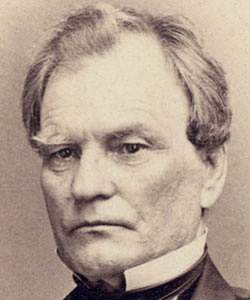Benjamin Franklin Wade (Congressional Biographical Directory)
Reference
WADE, Benjamin Franklin, (brother of Edward Wade), a Senator from Ohio; born in Feeding Hills, near Springfield, Hampden County, Mass., October 27, 1800; received his early education from his mother; moved with his parents to Andover, Ohio, in 1821; taught school; studied medicine in Albany, N.Y., 1823-1825; returned to Ohio; studied law; admitted to the bar in 1828 and commenced practice in Jefferson, Ashtabula County, Ohio; prosecuting attorney of Ashtabula County 1835-1837; member, State senate 1837-1838, 1841-1842; judge of the third judicial court of Ohio 1847-1851; elected as a Whig to the United States Senate to fill the vacancy in the term commencing March 4, 1851, caused by the failure of the legislature to elect; reelected as a Republican in 1856 and 1863 and served from March 15, 1851, to March 3, 1869; unsuccessful candidate for renomination in 1868; served as President pro tempore of the Senate during the Thirty-ninth and Fortieth Congresses; chairman, Committee on Territories (Thirty-seventh, Thirty-eighth, and Thirty-ninth Congresses); unsuccessful Republican candidate for the vice presidential nomination in 1868; resumed the practice of law in Jefferson, Ohio, in 1869; appointed a government director of the Union Pacific Railroad; member of the Santo Domingo Commission in 1871; died in Jefferson, Ashtabula County, Ohio, on March 2, 1878; interment in Oakdale Cemetery.
“Wade, Benjamin Franklin,” Biographical Directory of the United States Congress, 1774 to Present, http://bioguide.congress.gov/scripts/biodisplay.pl?index=W000005.
Benjamin Franklin Wade (American National Biography)
Scholarship
Entering the Senate at the same time as Charles Sumner, Wade joined a small group of antislavery senators who ceaselessly attacked the "peculiar institution" in general and the Fugitive Slave Act in particular. He gradually developed a reputation as a fearless radical who was as outspoken as he was honest, and he knew how to gain the respect of southern opponents. When threatened with a challenge, he let it be known that as a senator he would refuse to fight, but as Ben Wade he would not hesitate to do so. His pithy replies to southern taunts became famous, and, in addition to his antislavery stand, he was also active on behalf of a homestead bill and protective tariffs; however, he did not support special considerations for private corporations.
Strongly opposed to the Kansas-Nebraska Act of 1854, which opened the West to slavery, Wade joined with others to found the Republican party in Ohio. He made common cause with his radical colleagues in repelling southern attacks and continued to favor protection, homestead laws, and internal improvements. His political prominence caused him to be mentioned for the presidency in 1860.
Strongly opposed to the Kansas-Nebraska Act of 1854, which opened the West to slavery, Wade joined with others to found the Republican party in Ohio. He made common cause with his radical colleagues in repelling southern attacks and continued to favor protection, homestead laws, and internal improvements. His political prominence caused him to be mentioned for the presidency in 1860.
Hans L. Trefousse, "Wade, Benjamin Franklin," American National Biography Online, February 2000, http://www.anb.org/articles/04/04-01022.html.




